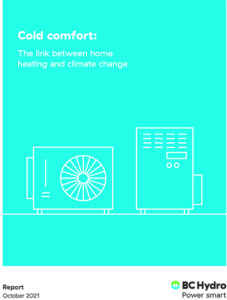Home »

Many unaware heating practices add to climate change
BC Hydro released a report last week that outlines how many British Columbians are unaware how home heating can contribute to climate change.
 The report titled, “Cold comfort: The link between home heating and climate change,” finds more than one-third of British Columbians think natural gas is the most environmentally friendly way to heat a home. Many of those surveyed appear to be unaware that gas furnaces significantly contribute to climate change.
The report titled, “Cold comfort: The link between home heating and climate change,” finds more than one-third of British Columbians think natural gas is the most environmentally friendly way to heat a home. Many of those surveyed appear to be unaware that gas furnaces significantly contribute to climate change.
“We are experiencing the first big drop in temperatures of the season and this Thanksgiving was one of the coldest in recent years,” said Susie Rieder, BC Hydro spokesperson. “However, before you power up your furnace, it’s important to be aware of what that means for the environment and climate change.”
The report finds the majority of British Columbians do not think home heating is a large contributor to climate change even though emissions are comparable to driving. For example, heating a typical single-family home entirely with natural gas each year can emit about two tonnes of carbon dioxide – that is about the same carbon footprint as driving a fossil-fuelled car for 8,000 kilometres.
Eleven per cent of B.C.’s greenhouse gas emissions – or about 6.9 million tonnes are from buildings and homes. More than 50% of British Columbians are currently using natural gas to heat their homes – this number jumps to two-thirds when looking at detached homes – and natural gas use is on the rise. Over the past few years, natural gas heating in B.C. homes has gone up four per cent, while electric heating as a primary source has gone down by three per cent.
BC Hydro generates 98% of its electricity from clean, renewable resources that are mostly powered by water. Because of this clean generation, making the switch from fossil fuels to using an electric heat pump at home is one of the biggest steps British Columbians can take to reduce their carbon footprint. While only 10 per cent of British Columbians are using electric heat pumps to heat their homes – and many do not know what they are – they provide the most environmentally friendly and energy efficient option for those looking to make the switch from natural gas.
BC Hydro customers can receive a rebate top-up if switching from heating a home with natural gas, oil or propane. When combined with the provincial CleanBC rebate and federal rebates customers could save up to $11,000. Some local governments also have additional rebates for their residents.
Benefits of switching to a heat pump include:
- Decreased emissions: Installing an electric heat pump in place of a gas furnace will significantly reduce home heating emissions.
- Two for one heating and cooling: Heat pumps extract heat from outside sources and during warm periods, heat pumps can reverse the process, acting like an AC unit.
- No-fuss/ low maintenance: Heat pumps require less maintenance than combustion heating systems, with an average lifespan of 15 years.
BC Hydro







